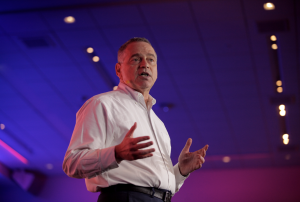Cardiologist Creates Podcast to Encourage Patients to Become More Involved in Health Care Decisions
 Harlan Krumholz, MD, had been a cardiologist and professor of social and policy studies at Yale School of Medicine for years when Claudine Litman, a former designer and student, introduced him to Charles and Ray Eames’ philosophy for making iconic furniture: Never delegate understanding.
Harlan Krumholz, MD, had been a cardiologist and professor of social and policy studies at Yale School of Medicine for years when Claudine Litman, a former designer and student, introduced him to Charles and Ray Eames’ philosophy for making iconic furniture: Never delegate understanding.
That is to say, the couple credited the superior style and quality of their furniture to their decision not to outsource understanding of how, where and why their furniture would be used.
“I thought, ‘Oh my gosh. This has such salience to the work I’m thinking about in health care,’” Krumholz says. “That’s exactly what I want to tell [patients]: Never delegate understanding. You don’t have to do that.”
Krumholz says this publicly on his Never Delegate Understanding podcast, which launched in October. In it, he talks with patient experts and innovators who are pioneering new ways of using technology, from online health records to online communities and wearable devices, as a way to improve their own care and that of others.
Medicine X attendees might recognize several of Krumholz’s guests, such as Liz Salmi, who turned her cancer diagnosis into an open-source chronicle of the patient experience through her blog; Hugo Campos, who fights for patient access to their medical records; and Sara Riggare, an engineer and engaged Parkinson’s disease patient. All have shared their stories with Medicine X.
And, on the podcast, they share how the ready availability of one’s own data, combined with positive partnerships with their health care professionals, is changing how health care is delivered. This approach puts health care more into the hands of patients, who are capable of using their data to improve their own care, and, in some cases, lead to new areas of research.
The idea was not to put these people on a pedestal and talk about how great they are – and they are great – but, rather to let others know them as people and for their journeys to inspire others to become similarly involved in their care,” Krumholz says. “And they also tell how change is coming to healthcare – the key role that patients are playing.”
He hopes that people hearing the podcast will identify with and be encouraged by their stories. He hopes they will make others want to exercise the same kind of partnership with their health care providers, and work toward better outcomes.
As for providers, he hopes the podcast will allow them to take off the yoke of omniscience and communicate with patients to “really, truly, deeply understand” what would help them make the right decisions for their situations. In this way, the podcast is a record of a moment we’re in today, “walking gingerly between eras” of health care.
“Medicine is an information science now, and information is free,” Krumholz says. “It’s a great equalizer, and we’re just at the beginning. It’s a good time for a podcast like this, so we can really talk about what can we do to positively accelerate the good things, and avoid what can be the unintended adverse consequences.”
External Link. You are about to leave the Stanford Medicine X website for an external website that is not maintained by the Stanford University School of Medicine. Links to external websites are provided as a convenience and should not be construed as an endorsement by the Stanford University School of Medicine of the views or products contained therein.
Never Delegate Understanding podcast website maintained by the Yale Broadcast Studio.






